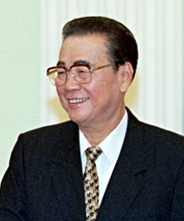Li Peng
Appearance

Li Peng (simplified Chinese: 李鹏; 20 October 1928 – 22 July 2019) was a Chinese politician. Known as the "Butcher of Beijing" for his role in the Tiananmen Square Massacre, Li served as the fourth Premier of the People's Republic of China from 1987 to 1998, and as the Chairman of the Standing Committee of the National People's Congress, China's top legislative body, from 1998 to 2003. For much of the 1990s Li was ranked second in the Communist Party of China (CPC) hierarchy behind then Party General Secretary Jiang Zemin. He retained his seat on the CPC Politburo Standing Committee until his retirement in 2002.
| This article related to China is a stub. You can help out with Wikiquote by expanding it! |
| This article about a political figure is a stub. You can help out with Wikiquote by expanding it! |
Quotes
[edit]- The fate and future of the People's Republic of China are facing serious threat! [citation needed]
Quotes about
[edit]- Developments in Afghanistan, Angola and Central America in 1988–9 were each regionally highly significant. In combination, these developments contributed greatly to a reduction in international tension. At the same time, they had far less of an impact on global attention than developments in the heartlands of the Communist bloc. These developments revealed two different tendencies. The brutal suppression in 1989 of pressure in China for political liberalisation, notably with the massacre of student protesters in Tiananmen Square in Beijing in April (but not only there), was central to the maintenance of a Communist bloc in East Asia. The decision to act followed tension within the leadership, with Zhao Ziyang, the General Secretary of the Party, being sympathetic to the protesters, whereas the Premier, Li Peng, wanted to use force against them. Ultimately, Deng Xiaoping backed Li. The People’s Daily referred to the pro-democracy movement as an ‘anti-Party and anti-Socialist upheaval’. It was seen as a challenge to the position and legitimacy of the Party leadership.
- Jeremy Black, The Cold War: A Military History (2015)

